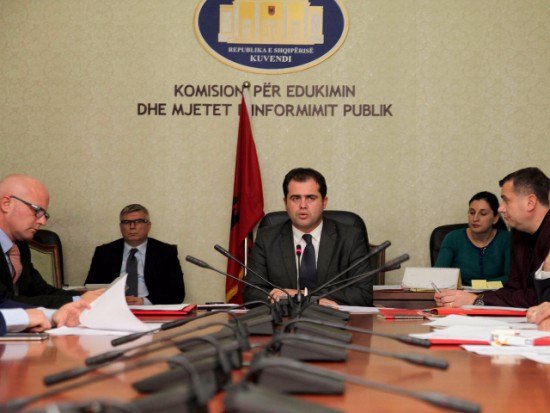Albanian Officials Reveal Past Crime Convictions
One minister, 10 MPs and five mayors have revealed that investigations were conducted against them in the first phase of implementation of a law that bans those with a criminal past from public office.
The cross-party parliamentary commission tasked wth cleaning up politics | Photo: LSA
The Albanian public has started to receive the first information about past criminal investigations into ministers, MPs, mayors and other officials, as a result of implementation of the law that bans people with past convictions from holding public office. The Central Electoral Commission, KQZ, on Friday published the questionnaires that all the senior officials have filled out, showing their relationship to justice institutions in the past.
One minister, 10 of Albania’s 140 MPs and five mayors reported criminal investigations and convictions in Albania or in European countries, starting from minor penalties for violating traffic rules and public order to illegal political activities, drug trafficking and participation in prostitution rings.
An MPs from the opposition Democratic Party, Mhill Fufi, declared that he was investigated twice in the 2000-2001 period on charges of exploiting prostitution, although the Prosecution did not take the charges to court.
The Mayor of Kruja and member of the ruling Socialist Party, Artur Bushi, said that he was investigated in Italy in 2010-2011 for drug trafficking. In his questionnaire, Bushi reveals that he was also investigated in 1996 in Italy for a matter that now he “does not remember” – and as a result is not specified.
The Democratic Party Mayor of Mallakastra, Agron Kapllanaj, admitted that he was jailed for two years in 2003 in Italy for an unspecified case.
The Socialist Mayor of Kavaja, Elvis Roshi, admitted he was investigated in 2002 in Germany for a case that he also “does not remember”.
Memory problems have also afflicted Socialist Movement for Integration MP Shkelqim Selami, who was investigated in Italy in 2007 for a case that he did not specify.
Adriatik Zotkaj the Socialist Mayor of Polican, was jailed for three years in 1996 for violating the road code. He was jailed again in 2001 for 10 months and in 2002 for another one year for opposing the police in unspecified events.
The Minister of Youth and Social Welfare, Blendi Klosi, is the only minister with a criminal investigation, though he said that the incident took place in 1994 when he was a student and when he says he just broke some beers bottles. “The prosecutor at the time categorized the incident as a criminal case and investigated me and my university friends for inappropriate action,” he said.
The questionnaires also revealed the phenomenon of politicians changing their names to conceal their troubled pasts. The Socialist Mayor of Kurbin, Artur Bardhi, revealed in his questionnaire that he previously went under the names of Gentian Lila, Altin Tanushi and Gent Bushi.
The revelations have caused expected political debates, although both main parties have almost the same number of people with a troubled past.
On Friday, the Democratic Party leader, Lulzim Basha, accused the Socialist Prime Minister, Edi Rama, of promoting people with a criminal past. “The criminalisation of politics is his black legacy,” Basha said. On the other hand, Prime Minister Rama on Facebook responded that the Democratic Party “continues its routine [of blaming the ruling party] at a time when those with past convictions were on their side”.
On Sunday, Democratic Party activists protested in front of Kruja municipality, demanding the resignation of Mayor Artur Bushi, claiming that he had other criminal records in his past that he did not declare in the questionnaire.
Friday’s declarations marked the first phase of implementation of a law enforced in January that aims to clean the public sphere of people with a criminal past. The next phase is verification of the questionnaries, which will be handled by 16 institutions. A special prosecution team has been formed to investigate the cases on parliament’s requests.
23 may 2016

